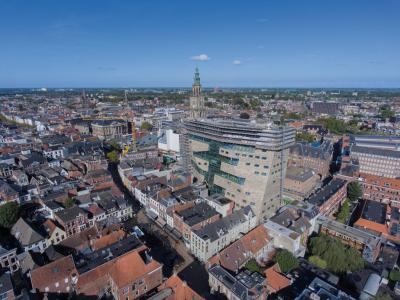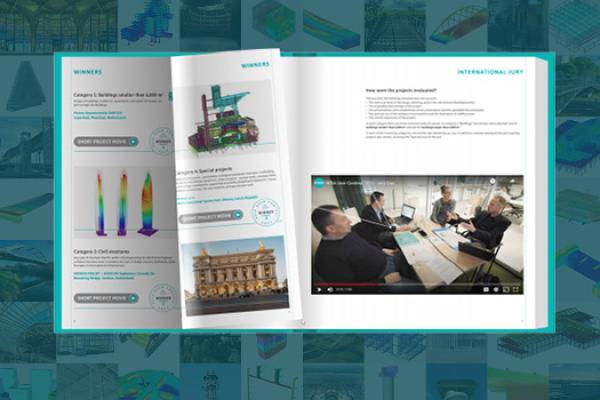
Details of Groninger Forum
- Country Netherlands
-
Software
- SCIA Engineer
- Construction date 19/12/2016

The Groninger Forum is a 35,000 m2 multipurpose conference building located in the heart of the city of Groningen, just a few meters from the famous Martini Tower. Commissioned by the municipality of Groningen, NL Architects Amsterdam designed a spectacular building in which the freely accessible 40 m-high atrium provides a spectacular view over the city. The contour of
the superstructure is characterised by the various wall surfaces extending obliquely in a forward or backward tilt. From this contour a ‘keyhole to the city’ that forms the atrium is achieved.
Located around the atrium, the Groninger Forum has ‘volumes’ housing five cinemas for film or debates, a ‘public demand’ cineac, training rooms, an auditorium annex theatre and various exhibition halls. Through the 20 m-long atrium, free span escalators transport the visitors, amid projections and presentations, to the indoor plazas. All the plazas located on 10 different levels, also
facilitate exhibitions and presentations. In addition, the Forum houses two open stages, workstations for students and self-employed people, a grand café, a movie café, a restaurant on the top floor, a roof cinema and a library. The substructure houses a 5-storey parking garage and a single-storey bicycle parking facility.
ABT is involved in feasibility studies of the plan, structural design, architectural plan development, construction management, project management and supervision, geotechnical consultancy, BIM coordination, design management and construction logistics plans.
The extreme oppositional oblique structure can be divided into two sections: super- and substructure. The superstructure consists of 11 floors, the substructure of a 5-layer parking garage containing approximately 400 parking spaces and 1,200 bike stable places. The gross floor area of the project is 20,300 m2 (cultural complex) and 14,500 m2 (substructure). The two concrete cores on the west and east side are the main stabilising parts of the building. The steel volumes, constructed from oblique trusses, are connected to these cores. At levels 9 and 10 a steel bridge connects the two cores. In order to limit the span of the volume cantilevers, additional vertical load-bearing lines (columns) are applied. Just one of the challenging ambitions of NL Architects: the columns may not be positioned in one vertical line, at any level. The trusses have different inclinations and the position of the vertical bearing elements is irregular in all directions. All floors have horizontal bracings in order to compensate for the oblique
position of trusses.
Unique for the steel trusses is that the top line of the trusses can slide at the top line until the building is complete. This prevents additional forces, partially caused by translating of the concrete core, negatively influence the steel structure.
The parking garage consists of concrete floors, walls and columns. The outer walls of the bicycle parking facility consist of traditional concrete walls. The deep basement diaphragm wall panels have the thickness of 1.0 to 1.2 m.
The floors of the garage give, in addition to the vertical traffic loads, horizontal support to the outer walls because of the elongated void in the middle. In order to optimise the construction process, an underwater concrete floor (thickness: 1.0 m) is made. All floors are made of steel fibre reinforced concrete.
From an engineering point of view, the Groninger Forum is a very complex structure. During the development ABT uses SCIA Engineer for all engineering challenges. In the preliminary stages, for 2D analysis of trusses and floors.
Later on, in the process for 3D analysis, detailed analysis of 2nd order, stability and stiffness, of sub-sections of the building. Finally, the sub-models are merged into one overall model.
This working method has resulted in an essential and exact understanding of the behaviour of the building and also given direction to the assembly plan.
The complexity of the building shape also has an effect on building the FEM models. Connecting the sloping floors and oblique facades demands a very precise model to ensure accurate results. Also, the aligning and connecting elements in transition areas required the necessary care. Due to the interface of SCIA Engineer, quick and steady editing of the geometry can easily be done.
SCIA has been organising user contests for years in which all kinds of projects can participate.
Curious about our last contest?
New: Now stacked with many embedded project and testimonial videos
